10 Essential Laboratory Glassware Manufacturers
Essential Laboratory Glassware
The manufacturing and selling of laboratory glassware is a fast-increasing industry nowadays. Increased awareness of health issues, increased demand for practical education, an increase in the number of lifestyle disorders, and the growth of the health, education, and rising laboratory requirements and research industries are driving the market for laboratory glassware manufacturer in India, Nigeria, Kenya, uzbekistan, Ethiopia, Uganda, Ghana etc.
A laboratory is a place where we practically explore education. And the thing that makes this expedition successful is the high-quality laboratory glassware. As a result, high-quality and precise laboratory glassware is required to better understand practical education. But what is the laboratory glassware list or what is the glassware used in the laboratory? Even if you don’t know the answer, it’s okay. Because that’s what we’ll talk about here, but first, let’s get the basics out of the way.
What is Laboratory Glassware?
Laboratory glassware is a term that refers to a wide range of scientific equipment that is traditionally constructed of Glass. Glass is commonly used in chemistry, biology, and analytical laboratories because it can be blown, bent, cut, molded, and formed into a variety of sizes and shapes.
Glassware dates back to the Phoenicians, who created the first glassware by fusing obsidian in campfires. Glassware evolved as other ancient civilizations mastered glassmaking, such as the Syrians, Egyptians, and Romans.
The laboratory glassware manufacturers in India make the laboratory glassware using several types of glasses. Each of them has different capabilities and is used for different works. For example- borosilicate glass cab bear thermal stress, quartz glass can withstand high temperature, block infrared and ultraviolet radiation, amber or darkened brown Glass is the best.
Since the outset, laboratory glassware manufacturer has worked tirelessly to develop and offer products that fulfill the ever-increasing demands of practical education. Let’s take a look at some glassware used in the laboratory.
Fundamental Laboratory Glassware

Aspirator Bottle: Solid or suspended particles in liquid fluids are sedimented using aspirator bottles. The container is filled with fluids. The giant solid particles settle to the bottom of the aspirator bottle after some time, and the stopcock is released to release the liquid into a collection flask.

Winchester Bottle: The Winchester bottle is a heavy glass bottle used to store chemicals and other laboratory salts. It is also known as the Boston round bottle. With a size of 2 imperial quarts, the “Winchester quart” bottle initially emerged in the U.K. in the 19th century.
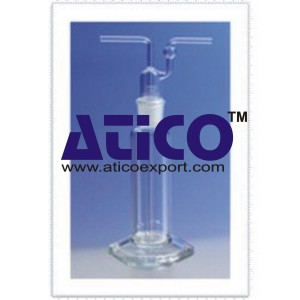
Glass wash bottle: A wash bottle is a nozzle-equipped squeeze bottle. It is used to clean a variety of laboratory glassware. On the top of a wash bottle, you’ll find a screw-top lid. To force the liquid out of the nozzle, we must apply force to the bottom of the container.

B.O.D. Bottle: This laboratory glassware is specially used for biological oxygen demand tests. When a sample solution is being filled, the bottle is generally built with a particular shoulder radius to push out all air from the inside of the container. The B.O.D. Bottles come in various sizes, but the standard size is 60 mL or more significant. They are mainly manufactured using type 1 borosilicate.

Volumetric Flask: A volumetric flask, also known as a measuring flask or graduated flask, is used to carry the fluids of a specific volume at a particular temperature. These flasks are commonly pear-shaped and constructed of glass or plastic, with a flat bottom. The opening of the flask is either equipped with a plastic snap/screw cap or a joint that can receive a PTFE or glass stopper.
Lab Glassware Manufacturers and suppliers in South Africa

Conical flask: Conical flask, also known as Erlenmeyer flask or titration flask. It is a flat bottom flask with a conical body. It was created by German chemist Emil Erlenmeyer in 1860. The primary difference between a conical flask and a beaker is that a conical flask has a narrow neck and tapered body. Erlenmeyer flasks have a large base with tapered sides and a short vertical neck.

Burette: It’s a glass tube with a tap on one end that only allows a specified amount of liquid to be delivered to any container. In the titration experiment, this chemistry lab equipment is employed. In high school, who hasn’t done a titration? It has a valve that allows you to control the flow of liquid.

Beakers: Beakers are a normal occurrence in a chemistry lab. They are composed of glass and feature a flat bottom surface. They are essential when it comes to retaining a chemical liquid or solid sample. No laboratory glassware list can be completed without a beaker.

Pipette: The purpose of this laboratory glassware is to measure and transfer a small volume of liquid (milliliters or microliters). It’s used to precisely measure the volume of a solution. It’s ma to deliver a specific amount of liquid. Volumetric, bulb, and belly pipettes are among the pipettes available from lab glassware manufacturers.

Weighing bottles: Weighing bottles are glass laboratory equipment that is used to weigh substances precisely. The majority of the bottles are constructed of thin, fragile glass, although they can also be made of ceramics or polymers. A weighing bottle comes in different shapes, for example- a flat glass dish, flatboat dish, tall-shaped dish, etc.
That was all about the glassware used in the laboratory. If you have come so far, then you must be seeking the best and most reliable laboratory glassware manufacturer in India. ATICO Export is a well-known and reliable company that makes and exports laboratory equipment all over the world.
ATICO Export: In 1954, ATICO Export was founded. It has a solid reputation in the market due to its more than 65 years of experience. This ISO-certified company designs and lab equipment manufacture for educational, scientific, technical, and engineering uses worldwide. The company’s core values have contributed to the growth of a devoted consumer base. They have set the standard high when it comes to providing precise and high-quality equipment to their consumers.

Key Role of Civil Engineers
Civil engineers play the key role in the construction, design and ideas to make the things real. If the one will not work cautiously then a cumulative negative effect will occur. So to avoid hazardous in work, Civil engineers must be skilled and well trained.
Their work is planned on the basis of economic conditions and safety issues. They must be skilled to manage and plan the working of surveyors, construction managers, civil engineering technicians, and others.
They use the principles of calculus, trigonometry, and mathematics for analysis, design, and disaster control in their working. License is required for the projects related to infrastructure. Untrained professionals would be dangerous for human life. So make sure that you are hiring or taking suggestions from a skilled, experienced and licensed professional.
Working of civil engineers:
- Technical and feasibility studies
- Use computer software for detailed designs
- Maintaining and adapting the infrastructure to consider about population growth, climate change and natural disasters.
- Skills to plan about requirements with the client and other professionals
- To plan the entire project based on the given materials, costs and time limitations.
- Consider the environmental impact and risks connected to projects
- Project must be in good running conditions with any risk
- Creation must based on no harmful effects in environment
- Resolving design and development problems
- Managing budgets and project resources
- Ability to present the necessary details about a project such that as bid proposals, environmental impact statements, or property descriptions
- Consider about time on delivery for purchasing and receiving materials
- Get all the required material from best Civil Engineering Lab Equipment Manufacturer.
Branches:
Based on the working areas Civil Engineers are mainly categorized:
- Geotechnical Engineers
- Structural Engineers
- Transportation Engineers
Geotechnical Engineers:
They study about the behavior of the earth materials and their affect on the constructed structure. Also they consider about the showing signs of problems with the earth materials under or near the structure, design and plan for slopes, retaining walls, and tunnels.
Structural Engineers:
Design and assess bridges or dams to analyze that the structure can safely suffer the stresses, forces and loads.
Transportation Engineers:
Planning, construction and management of streets and highways, but they also plan the structure of airports, ports, and harbours by using top quality Civil Engineering Lab Instrument.
Other Branches:
- Surveying
- Water Resource Engineering
- Environmental
- Municipal
- Coastal
- Tunnel
- Earthquake
- Material
Education required:
- You can do Diploma or Degree
- After Graduation, Post Graduation is also a good option
To be a good engineer, Students must have degree or diploma from a reputed university/College.
Engineering Lab Equipment Manufacturers
Like every other laboratory where research and experimentation happen, engineering laboratories require the right set of a whole range of tools and equipment. The engineering lab manufacturers ensure that all the requirements of engineering laboratories are met with the best lab equipment in terms of quality, pricing and usage. Engineering is the study and application of principles of science and mathematics to solve problems. It attracts the attention and curiosity of professional engineers worldwide, and young minds keen on the subject and who want to learn and apply their learning in the practical world. The engineering lab equipment manufacturers focus on providing a vast range of essential lab equipment to specialized lab equipment for hassle-free and smoothest research.
Engineering Lab Equipment List
The engineering lab manufacturers manufacture a whole comprehensive range of engineering equipment. Here are the various Engineering Lab Equipment List to whom engineering lab equipment suppliers supply at the most reasonable prices. The list is complete as the engineering lab equipment manufacturers and suppliers provide the leading quality engineering lab equipment for various branches of engineering.
Engineering Lab Equipment List given below:
- Mechanical Engineering Lab Equipment
- Civil Engineering Lab equipment
- Automobile Engineering Lab equipment
- Thermal Engineering lab Equipment
- Information Science and Engineering Lab Equipment
- Electronics and Instrumentation Engineering Lab Equipment
- Mechatronics Engineering Lab Equipment
- Instrumentation and Control Engineering Lab Equipment
- Production Engineering Lab Equipment
- Automation and Robotics Engineering Lab Equipment
- Instrumentation Engineering Engineering Lab Equipment
- Chemical Engineering Lab Equipment
- Structural Engineering Lab Equipment
- Construction Engineering Lab Equipment
- Robotics Engineering Lab Equipment
- Civil Engineering Lab Equipment
- Computer Science and Engineering Lab Equipment
- Biotechnology Engineering Lab Equipment
The list is vast as engineering lab equipment manufacturers provide a 360-degree range of equipment to all the branches of engineering without utmost efficiency and excellence. Let us discuss the 4 major branches of engineering where engineering lab equipment manufacturers have held their forte for a long time.
Mechanical Engineering Lab Equipment
Mechanical engineering is undoubtedly the most diverse branch of engineering that focuses on anything that moves. Yes, you read it right, and for this, mechanical engineers need a well equipped mechanical engineering lab equipment that facilitates their research and experimentation in the best possible way.
The features of Mechanical Engineering Lab Equipment are:
Mechanical engineers design and improvise everything from daily use machines like air conditioning, generators, microwaves, engines, etc., to high-grade complex machines like space ships, rockets, marines, tanks, etc.
Here is what engineering lab equipment manufacturers provide to mechanical lab engineers.
- Applied mechanics lab equipment
- TurboMachinery Lab Equipment
- Fluid Mechanics Lab Equipment
- Automobile Engineering Lab equipment
- Heat and Mass Transfer lab equipment
- Dynamics of Machine Lab Equipment
- Refrigeration & Air conditioning Lab Equipment
- Measurement Lab Equipment
- Robotics and Mechatronics lab equipment
- Fuel Testing Lab Equipment
- Materials Testing Lab Equipment
- Applied mechanics lab Equipment
Every piece of equipment manufactured for the mechanical engineering lab is
- Safe To Use
- Manufactured Under Strict Quality Controls
- Long Durability
- Manufactured After Complying International Quality Guidelines
- 100 per cent made with premium quality material
- Cost-effective
Mechanical Engineering Lab Equipment Manufacturers manufacture a vast range of mechanical engineering lab equipment that they supply to mechanical engineering labs in the domestic and international market.
Civil engineering Lab equipment
Civil engineering lab equipment aims to give civil engineers the resources that support their aim of building infrastructures that make our life easy and better.
Here is the list of equipment that civil engineering lab equipment manufacturers provide to civil engineers.
- Soil Testing Equipment
- Material Testing Machine Equipment
- Cement Testing Equipment
- Bitumen Testing Machine for Laboratory Testing.
- CBR Test Apparatus
- Soil Testing Equipment
- Plate Bearing Testing Apparatus
- Civil Lab Testing Equipment
- Civil Lab Concrete Testing Equipment.
Every piece of equipment manufactured for the civil engineering lab is
- Safe & Sturdy To Use
- Manufactured Under Strict Quality Controls & International Quality Guidelines
- Long Durability
- 100 percent made with premium quality material
- Available At Affordable Prices
Automobile Engineering Lab Equipment
Engineering Lab Equipment Manufacturers are renowned manufacturers of high-quality automobile engineering lab equipment in India and abroad. The speciality lies in manufacturing A1 quality Automobile Engineering Lab Equipment that facilitates the engineers to experiment, create, & innovate.
Automobile engineering is a dynamic branch of engineering growing at a pace like never before. Every day new advancements are happening in the automobile sector, and for this, the automobile engineers need highly sophisticated- Automobile Engineering Lab Equipment.
Here is a list of what engineering lab equipment manufacturers provide to automobile engineers:
- ABS Braking System Training Board
- Alternator Trainer
- Car Steering Trainer
- Cut Model Of Automatic Transmission System
- Planetary Gear System
- Cut Model Of Turbocharger
- Cut Section Model Of Four Stroke Petrol Engine
- Agricultural Tractor
- Common Rail Turbo Diesel Engine
- Rack And Pinion Steering
- Cut Model Of Rear Axle With Locking Differential
The Automobile Engineering Lab Equipment list is way vast. The best way is to contact the team of experts at Engineering Lab Equipment Manufacturers with your requirements. They shall give you a complete insight into all their equipment falling under this category at an exemplary quality and an unbeatable price by anyone in the industry.
Thermal Engineering Lab Equipment
In Thermal Engineering is a sub-discipline of mechanical engineering that refers to planning, designing, and maintaining heating and cooling systems. Thermal engineering lab equipment manufacturers need premium graded thermal engineering lab equipment that facilitates their R&D most effectively.
Here is the equipment list that thermal engineering lab equipment suppliers provide to thermal engineers:
- Single Cylinder Two Stroke Petrol Engine Test Rig
- Multi-Cylinder Four Stroke Petrol Engine Test Rig
- Single Cylinder Four Stroke Diesel Engine Test Rig
- Two-Cylinder Four Stroke Diesel Engine Test Rig
- Air Compressor Test Rig
- Air Blower Test Rig
- Single Cylinder Four Stroke Petrol Engine Test Rig
- Main Cylinder Air Cooled
- Automotive Diesel Engine
Thermal Engineering Lab Equipment manufacturers and suppliers have ensured that every equipment manufactured is
- Easy and safe to use
- Available at the most affordable rates
- Complies to all domestic and international standards of quality
- Built with 100% premium quality material
Engineering lab equipment suppliers are proud to be the suppliers of the vast range of engineering lab equipment supplied to schools, colleges, universities, engineering laboratories, educational and research institutions, etc. Striving excellence is our motto, and with this, we have never compromised our work ethics ever.
BEST MECHANICAL LAB Equipment Manufacturer and Supplier in India
We are spent significant time in assembling and sending out Mechanical Teaching Laboratory Kits with plan to move and connect with individuals of all capacities to grow their insight in Mechatronics office by offering an all-around planned, very much made creative gainful range. Performing tries different things with our items builds up your useful aptitudes to best. We Ambala based ATICO EXPORT gives an all-around prepared Mechanical Engineering Lab Equipment Manufacturers with most recent estimating Equipment and preparing units which encourages different understudies to learn, outline and test their trials as a piece of their scholastic educational programs.
We additionally give appropriate direction manuals hardware lab preparing packs which empowers anybody to change their inventive thoughts into genuine down to earth ventures. Being a quality conscious firm, we never compromise with the material to be used for the equipments so get all sort of superb Mechanical Engineering Lab Tools like process control simulator, digital logic lab, electric circuits lab, logic trainer, IC tool, automatic training system, natural cooling tower, water chilling plant, cold storage plant and so forth which are very much related and required to mechanical research center setup.
Atico Export is the regarded name which occupied with the way toward providing quality Mechanical Lab equipments at exceptionally least costs over the globe. Get all kind of durable Scientific Laboratory Equipment from the much well known Manufacturer, Wholesaler, Supplier, and Exporters of India.
We are the huge supplier from more than 60 years.
So in the event that you additionally need to be added to our fulfiled clients’ range, you can arrange any sort of Logical Laboratory Equipment, and we guarantee you to give a superior item satisfied range.
Get an opportunity to have the amazing Scientific Laboratory Equipment for your research and educational labs.
Atico Export is esteemed Mechanical Lab Equipment Manufacturer, Mechanical Lab Equipment Supplier, and Mechanical Lab Equipment Exporter in India. They provide efficient Mechanical lab Instruments for schools, colleges, universities and in like manner associations. Get a vast range of high-quality Scientific Lab Instruments for your all purpose needs.
Atico Export is the one stop solution for your satisfaction….
Find some Mechanical Lab equipment to organize your Educational Institutes-
BASIC ELECTRICITY CIRCUIT: Mechanical LAB Equipment
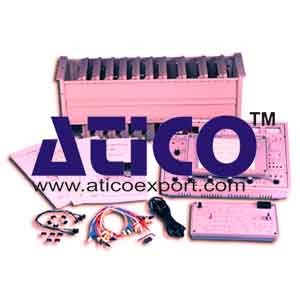
Mechanical LAB Equipment: LOGIC TRAINER
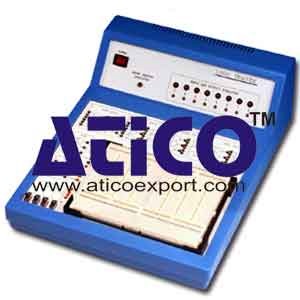
WIRELESS NETWORK COORDINATOR TRAINER
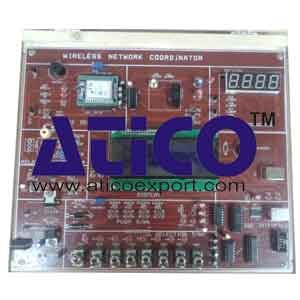
DIGITAL LOGIC LAB
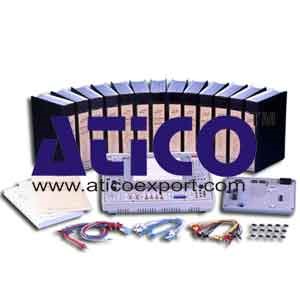
PROCESS CONTROL SIMULATOR

Mechanical Lab Equipments Manufacturers and Fluid Mechanics
Atico is manufacturing and exporting the wide range of Fluid Mechanics Lab Equipments and Mechanical Lab Equipments. We are making the products with excellent materials. Our business is growing day by day. There are lots of sub-categories of both the instruments furnished above. Let’s discuss about them.
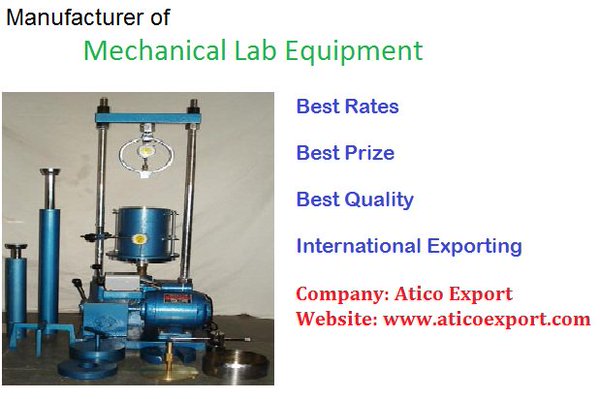
Firstly, there is a huge category of Fluid Mechanics Lab Instruments. Interface Unit is a part of it. It comprises a computer interface accessory for utilize with all capture MKII FM fluid machines. The manufacturing interface connects for FM device sensors via Single multi-way connector. Interface driver enables linking to other software packages.
Seepage Apparatus includes a self-contained bench. The bench is applied for trial studies of seepage and permeability troubles in porous media. The device needs a set of models, 230V, 50Hz, sump tank and pump and adjustable overflow etc.
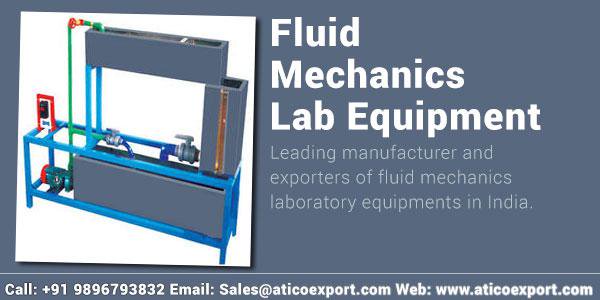
Hydrostatic Pressure and Fluid Mechanics Lab Equipments Manufacturer has accurately formed plastic quadrant, Educational software available as an option and Flotation tank with adjustable feet. The Tank capacity should be 5.5 liters, the height of fulcrum above quadrant is 100mm and cross-sectional area of tripod is 7.5 * 10^-3 m^2.
Secondly, we are giving new range of Mechanical Engineering Lab Equipment Suppliers. Study of A Pre Tensioned Bolt Manufacturer is the sub-category of Mechanical Engineering Instruments. This apparatus allows Effect of bolt pre tensioning using a hydraulic loading system, simple loading and stresses on plane section and many more. Dimensions and weights of device are 15diam. * 37 cm – 12kg, for pump: 40 * 10 * 14 mm – 3,5kg. It needs the electrical supply of 220V, 50Hz. It also requires Extensometer Bridge, a ring spanner 24mm and a torque wrench of capacity 40 – 200 Nm with 24mm nut.
There is a wide variety of Twist and Bend Testing Machine Manufacturers. It allows the huge demonstrations and experiments. The system includes bench mounted rigid triangular frame. The specimens can be distorted up to 25 mm. It measures the Young’s Modulus of Elasticity for three materials, study of bending and effect of distance between supports etc. The dimensions and weights are as follows: 70 * 70 * 20 cm – 25kg.
Friction Apparatus manufacturers compare the significance of coefficient of sliding friction between dry surfaces of many materials and ‘hard’ and ‘soft’ rolling surface. The dimensions of device are 370 * 240 * 300 mm and the net weight is 14kg.
Atico is spreading internationally with their brand instruments. Keep connecting with us to know more product details and specifications.
Atico Export in Ambala Cantt, sends you the best and astonishing quality Mechanical Engineering Lab Instruments at least costs in India. For more information please sign on to https://www.aticoexport.com/ or mail us you prerequisite at sales@aticoexport.com, kunal@aticoexport.com or call us at +91-999-618-6555.
VISIT –
https://www.aticoexport.com/product_category/mechanical-engineering/
CONTACT US –
+91-999-618-6555
+91-989-678-3832
WRITE US ON –
Research Lab Equipment List
Technology has had a significant impact on the research industry, resulting in a new generation of faster and easier-to-use tools that assist businesses in determining what their customers truly believe. The research sector is, at its core, a subject that aims to assist us in keeping up with change. To keep up with the market, even the research industry must evolve.
What is a Research Laboratory?
A research laboratory is a structure that enables scientists and engineers to perform scientific and technological investigations, experiments, and measurements in a controlled setting. Research laboratories conduct both primary and applied research.
Importance of Research Laboratory
According to the study, children who participate in well-designed laboratory activities develop problem-solving and critical-thinking skills, as well as exposure to reactions, materials, and equipment in a lab setting. In well-designed laboratory exercises, participants develop their problem-solving and critical-thinking skills while learning about reactions, combinations, and other substances. You now understand the significance of a research laboratory. Take a look at the list of laboratory research equipment.
Essential Research Lab Equipment List
Plant Growth Chamber
Plant growth chambers are specialized environmental test chambers for conducting plant growth tests in laboratories. The purpose of a plant growth chamber is to provide atmospheric conditions that encourage plant germination and growth. In these chambers or cabinets, humidity, temperature, and illumination are adjusted to create the optimal environment for researching the development of a certain plant.
Salt Spray Chamber
It’s used to see how corrosive environment-resistant the coating is. The salt spray tester provides a rushed approximation of a salty environment where the specimens are assessed for quality.
Micro Kjeldahl
The Micro Kjeldahl apparatus is a pre-assembled, ready-to-use micro digester that offers precise Kjeldahl digestion results. It’s designed for laboratories that need to measure protein or nitrogen in micrograms.
Heating Mantle
Instead of using a heated bath, a heating mantle, also known as an isomantle, is laboratory equipment used to distribute heat to containers. Unlike other heating devices such as hotplates or Bunsen burners, glassware containers can be placed directly on the heating mantle without considerably increasing the danger of breaking.
Flame Photometer
This device is used to examine inorganic compounds. It gives data on the concentrations of various metal ions. It’s photoelectric electronics measures the intensity of the flame color.
Laboratory Freezer
It’s a refrigerated cabinet that keeps volatile chemicals and biological specimens cool, between -40°C and 10°C.
Humidity Cabinet
Humidity Cabinets are used to replicate high humidity test conditions at fixed or changing temperatures. Water vapors are generated by heating water to precise temperatures, which provides the test chamber atmosphere.
Seed Germinator
Yes, as the name says, this instrument is used to germinate various seeds in the laboratory. This device was created specifically for seed germination chambers that use temperature, humidity, and light to create an artificial environment. These chambers play an important role in crop production.
Digital Nephelometer
Nephelometer microplate readers are used to quantify insoluble particles in liquid solutions. It determines the amount of light scattered due to turbidity.
Incubator Shaker
It’s temperature-controlled laboratory research equipment. This approach combines incubation and shaking. An incubator shaker is used for fermentation, biochemistry, enzyme manufacturing, and cell culture, all of which require quick vibration and temperature control.
Embalming Machine
This apparatus injects formaldehyde solution into cadavers at a higher rate than usual. The fact that the embalming machine does not produce any noise or vibration adds to its allure.
That was the end of the list of laboratory research equipment. You’ve come to the right place if you’re seeking a reputable laboratory research equipment manufacturer from which to purchase high-quality equipment. ATICO India is the most dependable and capable manufacturer of laboratory research equipment.
Why ATICO India?
Chemistry Lab Equipment: Vital Part of School Science Lab
What is Chemistry?
Chemistry studies matter’s structure, properties, and behavior to determine what happens when they change during chemical processes. And Chemistry Lab Equipment help us to determine all these process.
Chemistry is a branch of science concerned with the study of matter, its characteristics, and states. It explains how atoms join to produce elements and how compounds and molecules are formed when elements combine. It also specifies how a substance’s behavior varies depending on the circumstances.
Why do we need Chemistry and Chemistry Lab Equipment’s?
Every day, we deal with chemistry. Chemical reactions take place as you breathe, eat, walk, run, or sleep. Chemistry is employed in various sectors, including atmospheric science, medicine, environmental science, agriculture science, chemical engineering, solid-state physics, and biochemistry.
Here are a few examples of chemistry’s applications:
- Medicine: Chemistry knowledge is essential in the pharmaceutical sector. Pharmaceutical manufacturing necessitates the use of chemicals. Chemotherapy is used to treat a variety of fatal diseases. Chemicals are found in disinfectants, sterilizers, and other things. There would be no drugs if chemistry did not exist.
- Fuels: Chemical principles underpin refining activities, which result in the production of fuels such as compressed natural gas (CNG), hydrogen, diesel, gasoline, and liquefied petroleum gas (LPG) (LPG). Petrochemistry, a branch of chemistry dedicated to studying petrochemical processes, is crucial in this context. These fuels are used not only for transportation but also for a variety of other uses.
- Environment Conservation: When it comes to environmental protection, chemistry plays an important part once again. All of the pollutants and greenhouse gases produced throughout the manufacturing process contribute to global warming and, as a result, climate change. While these byproducts cannot be removed entirely, they can be limited and handled before being discharged into the environment.
- Space Travel: Have you ever been intrigued about how space travel works? It’s a difficult circumstance that has been made safer by the use of chemistry. It is, for example, developing environmentally friendly and effective fuel and food storage technologies and inventing mechanics capable of moving ships across long distances. Chemistry has played and will continue to play an essential part in advancing space flight to where it is now.
Chemistry lab equipment manufacturers have worked tirelessly since the beginning to create and deliver equipment that satisfies the ever-increasing demands of university chemical studies.
Let’s see the chemistry lab equipment list and their uses for school labs before we get started.
- Balance counter: It is robust, practical, and precise equipment with equal arms frequently used for general weighing in industries and labs. The pans are constructed of brass or stainless steel that has been dying pressed, while the body is made of cast iron.
- Flask: Flasks are helpful in chemical labs for a variety of reasons. It can be utilized for various purposes, including storage, chilling, mixing, heating, condensation, precipitation, and more. In a chemistry lab, a flask is a common sight.
- Burette: Burette is a glass tube with a tap on one end that can only supply a set amount of liquid to any container. This chemical laboratory apparatus is used in the titration experiment. Who hasn’t done a titration throughout their high school years? It contains a valve that you can use to control the liquid flow.
- Evaporating basin: It’s a type of laboratory glass that’s utilized in chemistry labs. Evaporation of supernatant liquids and solutions takes place in an evaporating basin. It can also evaporate additional solvents, such as water and make the solution more concentrated or even solid.
- Triple beam balance: This chemistry lab equipment is used to precisely determine the mass. This instrument has a reading inaccuracy of +/- 0.05 grams. As the name implies, it has three beams, the largest in the center beam, followed by the front beam and the uncommon beam.
Chemistry lab equipment list for schools was previously considered. You’ve come to the right site if you’re seeking chemistry laboratory tools from a reputable manufacturer. ATICO Export is a globally recognized and trusted chemistry lab equipment manufacturer and Chemistry Lab Equipment Supplier that supplies its products around the globe.
Why ATICO Export?
The company ATICO Export was founded in 1954. Because of its more than 65 years of experience, it has a strong market reputation. This ISO-certified firm creates lab equipment for educational, scientific, technical, and engineering applications all around the world. The company’s core values have helped it build a devoted customer base. They’ve set a high bar for themselves when it comes to providing precise and high-quality equipment to their consumers.
10 Most Advanced Material Testing Lab Equipment
What is Material Testing?
Material testing is a well-known method for determining raw materials and components’ physical and mechanical properties ranging from a single human hair through steel, composite materials, and ceramics. Material testing lab equipment suppliers provide several instruments to carry out the testing operation.
Why is it performed?
For many purposes, materials testing can provide a wealth of information on the tested materials, prototypes, or product samples. The data collected during testing, as well as the final test results, might be useful to engineers, designers, production managers, and others.
Some of the reasons why material testing is so important are listed below:
- Complying with regulatory standards
- Choosing the suitable materials and treatments for a project
- Product design or enhancement specifications are being evaluated.
- Verifying a manufacturing process
Material testing lab equipment suppliers provide several instruments to carry out the testing operation. The following is a list of significant material testing lab equipment:
- Vacuum Degassing Oven: This material testing lab equipment is manufactured by the material testing lab equipment manufacturer to remove air bubbles resulting from accelerated oxidative aging of asphalt binder. The tool contains a stainless vacuum vessel, encased band heaters, temperature controls, and integral vacuum.
- Servo-Pneumatic Asphalt is a low-cost dynamic loading universal test system that is ideally suited to test asphalt and unbound granular materials. It is used to measure stiffness modulus, assess resistance to permanent deformation, assessment of resistance of fatigue cracking, etc.
- Rolling Thin-Film Oven: The effect of heat and air on a moving film of semi-solid bituminous materials is measured in these ovens. The internal chamber is built of stainless steel. It is insulated with fiberglass or similar materials, with an engine-turned stainless steel external frame and a door with a centrally situated window.
- Resilient Modulus and Asphalt Testing System: The robust modulus and permanent deformation of unbound base/sub-base pavement materials can be determined using the Resilient Modulus Testing System (RMTS). It employs an axially stiff load frame with a beam-mounted electromechanical actuator to apply dynamic cyclic axial stresses and a GDS triaxial cell to confine the test specimen.
- Pressure Aging Vessel: The Pressure Aging Vessel (PAV) delivers a simulated long-term aged asphalt binder for physical property testing. Heat and pressure are applied to the asphalt binder to imitate in-service aging during a 7 to 10-year timeframe. The basic PAV process involves placing RTFO aged asphalt binder samples in stainless steel pans and aging them in a heated vessel pressured to 305 psi for 20 hours (2.10 MPa or 20.7 atmospheres). After that, samples are kept for use in physical property tests.
- Asphalt Coring Machine: This material testing lab equipment has various applications. It is used to sample concrete and asphalt slabs, pavements, and structures and to cut and retrieve cores and trim specimens for testing purposes.
- Digital Impact Test Machine: It is used to check the impact resistance of polymers. It calculates the energy absorbed by the sample after impact using energy conversion. The impact hammer’s precision will significantly impact the mass’s center location and impact speed, which will affect the test accuracy.
- Pendulum Impact Testing Machine: Material testing lab equipment manufacturers made this tool to conduct Izod and Charpy tests. Antifriction bearings are used to mount the pendulum. The pendulum swings down to break the specimen in the Charpy test, and the energy absorbed in the model is between the height of drop before rupture and the size of rising after rupture of the test specimen. The reading is shown on a dial scale starting at the highest pointer position. MCS has created an electronic microprocessor-based panel with a digital display called the MIT – 30 (E). On the digital display, the reading is immediately available. It also came with a printer interface.
- Torsion Testing Machine: Torsion Testing is a torque transducer system that detects a method of determining the strength of Torque, and machines are designed to conduct torsion and twist on various metal wires, tubes, and sheets materials. Torque ranges can be altered with an auto torque selector, and Torque can be applied to specimens using a geared motor and gearbox.
- Tensile Strength Tester: A tensile tester, also known as a pull tester or universal testing machine (UTM), is an electromechanical test instrument that uses a tensile force (pull force) to measure the strength and deformation behavior of a material until it breaks.
If you want to buy the equipment from a reputed material testing lab equipment manufacturer, you can rely on ATICO Export. It is the leading material testing, scientific and technical lab equipment manufacturer. They manufacture different testing tools like raw materials testing tools, civil engineering testing lab equipment, etc.
Five Must-have Material Testing Lab Equipment
Must-have Material Testing Lab Equipment
material testing lab equipment manufacturing and sales are a rapidly increasing industry nowadays. Increased awareness of quality issues, increased demand for practical education, increased number of lifestyle changes, and the growth of practical education, and rising laboratory requirements and research industries are driving the market for material testing lab equipment suppliers in India. But where can you find high-quality material testing lab tools? There is no need to worry if you don’t know the answer. Because that’s what we’re going to talk about today, but first, let’s cover the basics.
What is Material Testing?
Material testing is a well-known method for determining raw materials and components’ physical and mechanical qualities, ranging from human hair through steel, composite materials, and ceramics.
There are several types of material testing; some of them are elaborated below:
- Tensile testing: Tensile testing is one of the most common techniques to check material behavior while applying a central stretching force. This test is used to figure the tensile features of a matter and is performed under ambient conditions. This testing technique is performed on several materials like plastic, paper, composites, adhesive, fabric, film, rubber, etc. Strain, stress, work at the break, young’s modulus, chord slope, deflection of maximum load, etc., are the standard tensile testing results.
- Coefficient of friction: The most significant value of the frictional force divided by the normal force is the coefficient of friction (COF). The coefficient of friction testing is used for different kinds of materials like films, lubricants, ceramic tiles, etc. It’s usually defined as the ease with which two surfaces (typically made of other materials) glide against one another. It’s the frictional force multiplied by the normal force to get the maximum value.
- Young’s Modulus Testing: The rate of strain change as a function of stress is known as Young’s Modulus or Modulus of elasticity. It denotes the straight-line section of a stress-strain curve’s slope. Tensile modulus is what it’s called when it comes to tensile testing. This testing is used to check the behavior of a sample under a central stretching load. The results consist of tensile strength, yield strength, elongation, elastic limit, and young’s modulus. The SI unit for Young’s Modulus is N/mm2 or MPA.
- Ductility: The ability of a material to withstand deformation without cracking is referred to as “ductility.” A ductility bend test determines a material’s capacity to survive cracking during a single continuous bend to check its quality. Before the failure, a ductile fracture undergoes a significant degree of plastic deformation.
- Elastic limit: The highest stress given to a sample without inducing permanent deformation is measured while determining the elastic limit. The elastic limit of metals or other rigid materials with a straight-line section in their stress/strain curve is roughly equal to the proportional limit. Apparent Elastic Limit is an arbitrary approximation of the elastic limit of materials that do not have a sizeable straight-line section on a stress/strain curve, such as rubber or plastic.
- Bend Strength: There are two types of bend strength testing- 3 point bends and 4 point bends. Generally, metal, wood, ceramic tiles, drywall, glass, particleboard, etc., are testing using bend testing. There are many industry standards, most of which are depending on the sample material being tested. Bending tests are used to determine the elasticity of sample material. Bending tests may entail pushing the sample material to a specific limit and calculating the load measurement and its relationship to a load standard.
- Compression testing: It is one of the most common methods of testing used to check the compressive force or crush resistance of a substance. It also checks the capability of a material to recover after that compressive force is being applied. Compression testing is frequently used to determine whether a rupture or a limit has occurred. A load limit or a deflection limit is utilized when the test is completed to a limit.
- Tear Resistance: It is the measurement of a material’s ability to resist tearing. This testing method is used in the paper, textile, and plastic film industries. The speed of the test, such as the test speed used to induce the tear, can significantly impact tear resistance. Tear propagation resistance is common in materials such as paper and rubber for acceptability testing. The load required to propagate a single “rip-tongue” tear in textiles is known as tear resistance.
- Puncture Strength: Puncture strength tests are performed to determine a material’s puncture or rupture properties. It is usually a compressive test in which a material is crushed using a probe or other device until it ruptures or reaches an elongation limit. Puncture testing is a standard method for determining the strength of a material like a film, rubber, or membrane. It’s also commonly used in the food processing business to determine a product’s texture and maturity. Puncture testing is used in medicine to assess the sharpness of a syringe, scalpel, or blade and determine the resistance and flexibility of synthetic skin.
- Bond Strength: It involves determining the force required to break a bond between two metals. Typically, the test entails determining a bonding agent’s shear and flexural bond strength and comparing bonding agents under various environmental circumstances. Within the adhesive interphase area, the broken surface created can be compared to failure analysis results.
Material testing allows us to determine whether specific material or treatment is appropriate for a given application. Testing can assist limit down the choices to the most acceptable material and treatment for the intended use, given the wide variety of materials and treatments available on the market.
Material testing lab equipment suppliers supply several tools to carry out the testing procedure. The primary material testing lab equipment list is given below:
Fundamental Material Testing Lab Equipment
Tensile testing machine: This material testing lab equipment is a universal testing machine purposely designed to determine tensile strength. It is also known as a tension testing machine. It measures the properties like yield strength, modulus, elongation, and tensile strength.
Torsion testing machine: This machine is configured to evaluate the twist and torsion on several metal tubes, sheets, and wire materials. It is also beneficial to know information like maximum torque, shear stress, breaking angle, or shear modulus of a material.
Spring testing machine: It is used to test the coil springs and laminated springs under bending and compression loads. Material testing lab equipment manufacturers thoroughly monitor the sensitivity, accuracy, and calibration of these machines at every stage of the manufacturing process.
Tensile strength tester: It is also known as a universal testing machine or a pull tester. This device applies a pull/tensile force to the substance to evaluate the deformation behavior and strength until the break.

Impact testing machine: This material testing lab equipment is used to determine the maximum capacity of the material against high-rate loading. It is also used to evaluate the service life of a substance.
That was the material testing lab equipment list. Since the material testing is crucial, then the equipment used in the lab should also be well-made and of the highest quality possible. Here, ATICO Export will help you. ATICO Export is the best material testing lab equipment manufacturer in India satisfying its customers so far.
Why ATICO Export?
ATICO Export was established in 1954. It has a solid reputation in the market due to its more than 65 years of experience. This ISO-certified company creates laboratory equipment for educational, scientific, technical, and engineering purposes worldwide. The company’s core values have contributed to the growth of a devoted consumer base. They have set a high standard for themselves when providing precise and high-quality equipment to their consumers.



